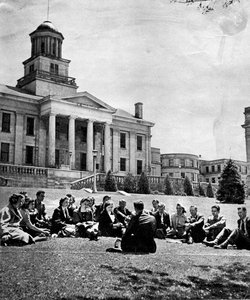Teach Me How To Write The Great American Novel! Or Just Give Me An A!
Half the RPCVs I know are teaching creative writing at colleges and universities; the other half of my RPCV friends are taking writing classes.
Now, what does that tell us? Can’t any RPCV get a real job after the Peace Corps or do they all want to be novelists or teach novelists?
To help those looking for a school or career as a writer, there’s a new book out from Harvard University Press entitled The Program Era: Postwar Fiction and the Rise of Creative Writing by Mark McGurl. McGurl teaches at Stanford. His new book was reviewed at length by novelist Diane Johnson in The New York Review of Books, November 7, 2013 issue. It’s well worth the read, regardless of where you sit in the college classroom.
McCurl’s book makes the point that the rise of American creative writing programs is a “peculiar and suggestive phenomenon,” though, as Diane Johnson points out, “it’s not clear what all that writing means.” McCurls also points out that teaching creative writing is a “relatively new, and originally American.”
Today there are more than 350 full-time, accredited writing programs in America, most of which offer the “ubiquitous and valued MFA, and often the Ph.D. in creative writing.” On top of that are writing seminars, workshops, summer conferences, everything from Bread Loaf and Sewanee, to Sun Valley and Squaw Valley, and your local YMCA! Every writer is studying somewhere.
What this has meant, McCurl sums up, is that our (i.e., American) writing has come to have certain qualities in common because writers and readers and teachers all have been promulgating three dicta, which he takes to be fundamental to creative writing programs, if not to literature itself:
1. Find your voice.
2. Write what you know.
3. Show don’t tell.
The first of these two dicta have produced, according to McCurl, “a literature of solipsism, an inward turn toward first-person narratives and parochial, self-involved subjects, American narcissism.”
By comparison, he goes on to write, in French and English fiction and Middle European literatures there is less “first-person” and more telling instead of showing.
However, as Diane Johnson points out in her essay/review, “what we know best is ourselves, so writing in our own voices about our own experiences is easiest. This has also meant, “finding your voice and writing what you know have led us into fascination with autobiography.”
While Johnson discusses McCurl’s complaints about American fiction, she also mentions that he targets the creative writing culture, saying the ‘writing seminar’ has developed a “specific, venerated, and almost inviolable format.” McGurl’s term for it is ‘collective specular sodomy.’
McCurl goes onto detail what the workshop’s dynamic is…”a manipulation of pride and shame.”
There’s more here, in Diane Johnson’s essay/review, and certainly Mark McGurl’s book of 466 pages of creative writing history. I have buy the book and find out everything that I have been doing wrong all these years of writing novels.

Mark McGurl
P.S.
For the essay/review, the NYRB has a great photo of a 1940s writers’ workshop at the University of Iowa. Students and their professor  sitting on the grassy lawn outside of the Old Capitol building where the guys are wearing suits and ties and the women are wearing dresses and jackets. It looks like a photo from early Peace Corps Training back in the early ’60s when we were all on college campuses and everyone dressed as if we were were going off to church after we all learned about Communism in the Third World.
sitting on the grassy lawn outside of the Old Capitol building where the guys are wearing suits and ties and the women are wearing dresses and jackets. It looks like a photo from early Peace Corps Training back in the early ’60s when we were all on college campuses and everyone dressed as if we were were going off to church after we all learned about Communism in the Third World.
And then there were those RPCVs, like myself, who went into journalism, another kind of writing, which, I guess, would not be called “creative” by most everyone except the people we wrote about.
I wonder how many of the best-selling authors took creative writing courses at some point in their lives?
There appears to be a divide between those who were trained to write and those who were born to write.
But, is it good, creative writing that sells books? Should one write was is popular and enjoys a commercial success or write for the sake of writing?
I’ll have to look up that article, John. Thanks for your thoughts on it.
I think “show, don’t tell” is related to the influence of movies on writing. There isn’t a lot of “telling” in movies. Instead, movies give us scenes.
Fiction needs to be credible, which writers often interpret as their needing to have first-hand experience of their subject matter. But it’s fiction, and therefore the imagination, if powerful and perceptive enough, can substitute for experience. Otherwise, yes, fiction can become a well-written (or badly written) exposé on one’s navel. Or: one can join the Peace Corps and acquire a bunch of non-navel material!
Writing programs? I’m guilty of working in one.
Informal writing programs have existed for a long time: Writers have always gotten together to exchange work and build each other up (or tear each other down). Tolstoy and Turgenev, Hemingway and his Lost Generation pals. Writing programs merely formalize this informal exchange. Are they helpful or harmful to the writer? To the culture?
I suppose it depends on who is answering the question.
Cynically, one might say – It doesn’t matter much to the culture. Books themselves no longer have much of an impact in American life. Do something silly during the Video Music Awards and then you’re moving the cultural mercury!
The ideal job for a fiction writer is…fiction writer! But who’s lucky enough to live off his/her fiction?
Thanks, John.
Mark
Thanks, John, for noting McGurl’s book and Johnson’s review. Whether or not ‘creative writing’ courses generate great writers, new technologies offer writers new platforms.
Now if only one could discover how to generate more serious readers beyond those who just scan their smartphones day and night or simply consume 144-character twitter feeds!